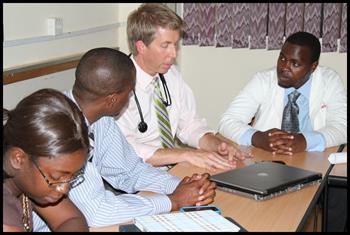Colorado-Zimbabwe International Exchange (CoZIE) program
 Colorado-Zimbabwe International Exchange (CoZIE) was launched in 2015 as a bilateral exchange program between the Department of Medicine in the University of Colorado School of Medicine (DOM CU SOM) and the Department of Internal Medicine in the University of Zimbabwe College of Health Sciences (UZCHS).
Colorado-Zimbabwe International Exchange (CoZIE) was launched in 2015 as a bilateral exchange program between the Department of Medicine in the University of Colorado School of Medicine (DOM CU SOM) and the Department of Internal Medicine in the University of Zimbabwe College of Health Sciences (UZCHS).
CoZIE is based on the long history of strong and productive collaborations in education and research between faculty at UZCHS and CU SOM and is designed to provide diverse experiences in internal medicine practice for faculty and postgraduate trainees, and to introduce post-graduate trainees at both institutions to modern methods of clinical teaching and clinical research.
Apply to CoZIE
Applications for CoZIE are solicited annually at each institution and are reviewed by the Selection Committee which will include faculty from both institutions.
Please contact Suzanne Brandenburg (suzanne.brandenburg@cuanschutz.edu) or Tom Campbell (thomas.campbell@cuanschutz.edu) for more information.
- COZIE Guide
- DOM/CU SOM faculty spend
2 weeks at UZCHS as a Visiting Professor and during that time participate in
bedside clinical teaching, didactic teaching, and career mentorship of UZCHS
trainees.
- UZCHS faculty are
invited to the CU Anschutz campus as DOM Visiting Professors to give DOM grand
rounds, morning report, plan collaborations, and teach residents, fellows and
faculty.
- Postgraduate trainees
are expected to develop their own individualized training plan, with the
oversight of their mentors, to fit their personal career goals.
- UZCHS MMeds spend two to
three consecutive weeks at CU Anschutz where they observe patient care at UCH
or other SOM-affiliated hospitals and participate in teaching of medical
students.
- DOM/CU SOM Internal Medicine and Medicine-Pediatrics residents can rotate through UZCHS for a one-month elective which is fully funded. Residents spend four consecutive weeks at UZCHS during which time they participate in direct patient care at the Parirenyatwa Hospital, bedside teaching of students, outpatient continuity clinics, and clinical research. Interns and residents will work on inpatient teams with UZCHS faculty, residents, and medical students. This clinical rotation is designed to provide meaningful exposure to healthcare provision in resource-poor and diverse academic settings and to model modern methods of clinical teaching.
The focal point for CoZIE activities is the Parirenyatwa Hospital, the major teaching hospital of UZCHS, located on the UZCHS campus adjacent to the medical school. This rotation provides UCSOM visitors with global health experience in a large hospital in an academic setting in southern Africa.
There are opportunities to learn about the diagnosis and care of diseases that are uncommon in the United States including tuberculosis, malaria, rheumatic heart disease and Kaposi’ sarcoma, to see uncommon presentations of common diseases such as diabetes and hypertension, and to experience academic medical practice in resource-constrained setting.
There are opportunities to mentor and teach Zimbabwean students and young doctors. CoZIE participants interact with variety of learners on the hospital wards including medical students (third-years through final years), house officers (interns) and MMeds (residents) and registrars (post-residents).
Teaching/educational opportunities include Post-take (post-call) Rounds and bedside teaching on ward rounds. There are also weekly specialty clinics and lectures/conferences most days including Progress in Medicine talks, Endocrine Clinic, Endoscopy Lab, Neurology Clinic, Skin Clinic, Cardiology Clinic, Kaposi Sarcoma Clinic and Opportunistic Infections Clinic.
“Patient care with limited resources was impressive as it required a completely different approach to medicine than what I am accustomed to in the United States.”
“We have much to learn from each other given our unique circumstances though we share a commitment to education, scholarship and clinical care.”
“I was reminded of how much can be accomplished in a setting with scarce resources based on the skills and acumen of the physicians.”
“I was impressed by the clinical skills of the residents and doctors who were working with limited resources. Their clinical knowledge was very extensive and they were very thorough and confident in their physical exam skills.”
“I was forced to take a different perspective in approaching diagnoses and treatments due to the limitations that I saw. It forced me to think deeper about my patients with less information.”
“I was exposed to many fascinating patient cases that presented as advanced pathology. Many HIV-related illness, congenital cardiac conditions and how other chronic diseases including hypertension and diabetes affect populations across the globe. I learned an immense amount about triage and prioritization of care and management of patients from house-staff and faculty.”
“Even in a relatively resource-limited setting, the quality of care that can be rendered is quite robust for many conditions. This is a testament to the diligence of the clinical staff and trainees.”
“I really gained a renewed enthusiasm for bedside teaching…I think renewed emphasis on this aspect of medicine would be helpful in the United States.”
Program Leads
Thomas Campbell, MD
thomas.campbell@cuanschutz.edu
Nancy Madinger, MD
nancy.madinger@cuanschutz.edu
Suzanne Brandenburg, MD
suzanne.brandenburg@cuanschutz.edu